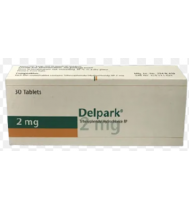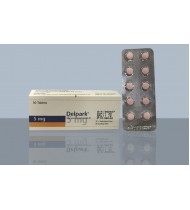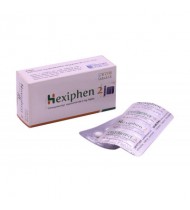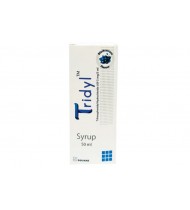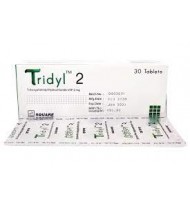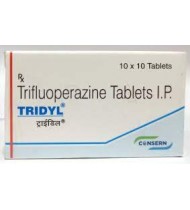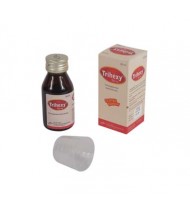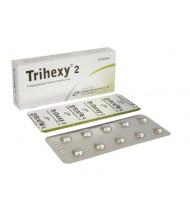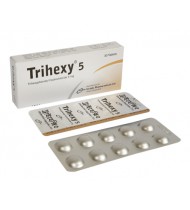Trihexyphenidyl Hydrochloride
Indications
Description
Pharmacology
Dosage & Administration
Idiopathic Parkinsonism: 1 mg of Trihexyphenidyl may be administered the first day. The dose may then be increased by 2mg increments at intervals of three to five days.
Drug-Induced Parkinsonism: Commence therapy with a single 1 mg dose increase the total daily dosage to 5-15 mg range if the extrapyramidal manifestations are not controlled.
Concomitant Use with Levodopa: When Trihexyphenidyl is used concomitantly with levodopa, the usual dose is 3-6 mg daily.
Interaction
Contraindications
Side Effects
Pregnancy & Lactation
Precautions & Warnings
Overdose Effects
Therapeutic Class
Storage Conditions
Delpark Tablet 1 mg
IndicationsTrihexyphenidyl Hydrochloride is indicated as an adjunct treatment of all forms of parkin..
3.00Tk.
Delpark Tablet 2 mg
IndicationsTrihexyphenidyl Hydrochloride is indicated as an adjunct treatment of all forms of parkin..
5.50Tk.
Delpark Tablet 5 mg
IndicationsTrihexyphenidyl Hydrochloride is indicated as an adjunct treatment of all forms of parkin..
12.00Tk.
Hexinor Syrup 50 ml bottle
IndicationsTrihexyphenidyl Hydrochloride is indicated as an adjunct treatment of all forms of parkin..
100.00Tk.
Hexinor Tablet 1 mg
IndicationsTrihexyphenidyl Hydrochloride is indicated as an adjunct treatment of all forms of parkin..
3.00Tk.
Hexinor Tablet 2 mg
IndicationsTrihexyphenidyl Hydrochloride is indicated as an adjunct treatment of all forms of parkin..
5.25Tk.
Hexinor Tablet 5 mg
IndicationsTrihexyphenidyl Hydrochloride is indicated as an adjunct treatment of all forms of parkin..
11.00Tk.
Hexiphen Tablet 2 mg
IndicationsTrihexyphenidyl Hydrochloride is indicated as an adjunct treatment of all forms of parkin..
5.50Tk.
Hexiphen Tablet 5 mg
IndicationsTrihexyphenidyl Hydrochloride is indicated as an adjunct treatment of all forms of parkin..
12.00Tk.
Parkifen Tablet 5 mg
IndicationsTrihexyphenidyl Hydrochloride is indicated as an adjunct treatment of all forms of parkin..
12.00Tk.
Parkifen Tablet2 mg
IndicationsTrihexyphenidyl Hydrochloride is indicated as an adjunct treatment of all forms of parkin..
5.00Tk.
Tridyl Syrup 50 ml bottle
IndicationsTrihexyphenidyl Hydrochloride is indicated as an adjunct treatment of all forms of parkin..
125.00Tk.
Tridyl Tablet 2 mg
IndicationsTrihexyphenidyl Hydrochloride is indicated as an adjunct treatment of all forms of parkin..
5.00Tk.
Tridyl Tablet 5 mg
IndicationsTrihexyphenidyl Hydrochloride is indicated as an adjunct treatment of all forms of parkin..
5.00Tk.
Trihexy Syrup 50 ml bottle
IndicationsTrihexyphenidyl Hydrochloride is indicated as an adjunct treatment of all forms of parkin..
100.00Tk.
Trihexy Tablet 1 mg
IndicationsTrihexyphenidyl Hydrochloride is indicated as an adjunct treatment of all forms of parkin..
3.00Tk.
Trihexy Tablet 2 mg
IndicationsTrihexyphenidyl Hydrochloride is indicated as an adjunct treatment of all forms of parkin..
5.00Tk.
Trihexy Tablet 5 mg
IndicationsTrihexyphenidyl Hydrochloride is indicated as an adjunct treatment of all forms of parkin..
10.00Tk.


